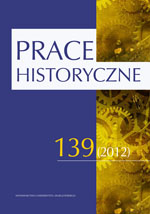Hołd cieniom wieszcza o Skargowej mądrości, czyli krakowskie obchody setnej rocznicy urodzin Zygmunta Krasińskiego
Homage to the Shadows of the Prophet of the Skarga Stature, that is the Krakow Celebrations of the Centenary of Zygmunt Krasiński’s Birthday
Author(s): Krzysztof Karol DaszykSubject(s): History
Published by: Wydawnictwo Uniwersytetu Jagiellońskiego
Keywords: Piotr Skarga; Zygmunt Krasiński; Krakow
Summary/Abstract: The year 1912 – that is a time when dreams of regaining national sovereignty and launching new irredentist activities began to be reborn in the Polish society (in connection with the political turmoil in Europe auguring an imminent outbreak of the “great war”), was associated with a few important historical anniversaries, namely: the 300th anniversary of the death of Rev. Piotr Skarga, the 100th anniversary of the death of Hugo Kołłątaj, the 100th anniversary of the birth of Zygmunt Krasiński and Józef Ignacy Kraszewski, and finally the 100th anniversary of the expedition of Napoleon’s Great Army on Moscow; it was particularly the latter event that was being associated with the hopes of ‘resurrecting’ Poland within its pre-partition borders. The above-mentioned anniversaries created an excellent opportunity for the Poles to manifest – wherever possible – that is chiefly on the territory of autonomous Galicia and among the émigré circles – their patriotic feelings. For the individual political factions, these jubilee celebrations constituted an excellent pretext to intensify the struggle for the proverbial “rule of the souls”. In the year 1912 in Kraków it was primarily the memory of the author of Nie-Boska komedia and Irydion (23 February), and secondly (25–27 September) that of the author of the famous Kazania sejmowe /Diet Sermons/, that were being celebrated. The latter of the two celebrations had, above all, the character of a religious holiday. Whereas in connection with the homage paid to the memory of Zygmunt Krasiński, there appeared clear accents and allusions as well as ideologicalpolitical polemics, no scholar researching the post-partition history of the Poles can pass by with indifference. To put things in a nutshell, for the Kraków conservative-conciliatory circles which eagerly took over patronage over the organization of the celebrations associated with the 100th anniversary of the birth of the “third national poet-bard”, this holiday became an excellent opportunity to recall the warnings of the author of Nie-Boska komedia against the dire consequences of all socially radical ideologies (in the contemporary Galician realities, this meant above all, a warning against the socialists grouped around Ignacy Daszyński) and also against propagating the idea of “deed-work” rather than “deed-struggle” (as all irredentists who were then setting up unions and Polish Rifle Squads seemed to require).
Journal: Prace Historyczne
- Issue Year: 139/2012
- Issue No: 1
- Page Range: 69-94
- Page Count: 26
- Language: Polish

